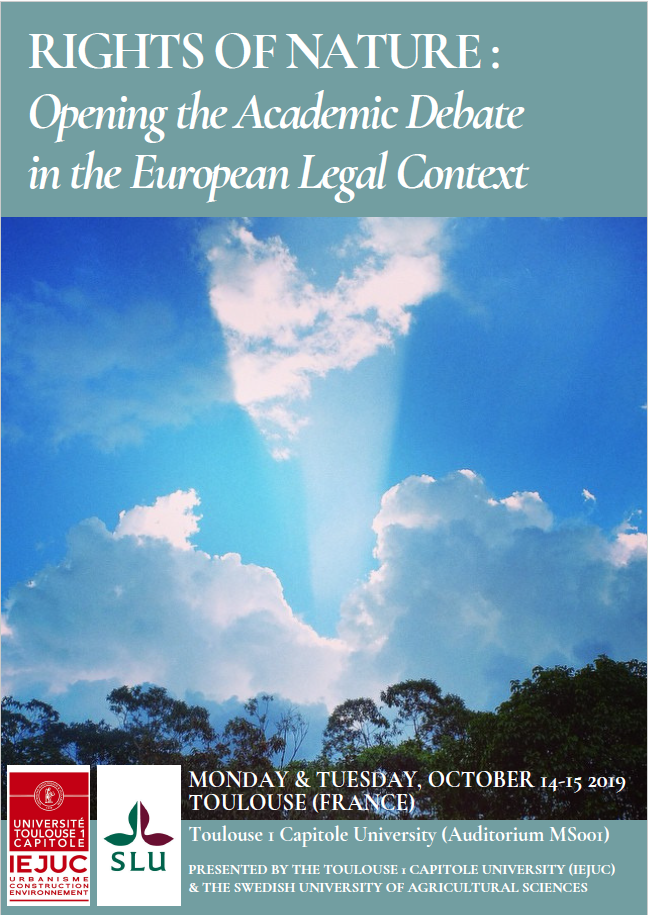Recherche
"RIGHTS OF NATURE : Opening the Academic Debate in the European Legal Context", colloque de l'IEJUC
"RIGHTS OF NATURE : Opening the Academic Debate in the European Legal Context", colloque de l'IEJUC
du 14 octobre 2019 au 15 octobre 2019
Manufacture des Tabacs
- Responsable scientifique : Julien Bétaille
- Intervenants : Jan Darpo, John Knox, Delphine Misonne, Pierre Brunet, Gonzalo Sozzo, Guillaume Chapron, Karen Bradshaw, Olivier Clerc, Loïc Peyen, Matthieu Poumarède, Yaffa Epstein, Michel Prieur, Alexandre Zabalza, Marie Eude, Joël Andriantsimbazovina, Hendrik Schoukens.
- Présentation :
L’idée d’attribuer la personnalité juridique à la nature, et plus largement de lui reconnaître des « droits », est ancienne. Elle a été émise pour la première fois par un auteur américain, Christopher Stone, dans un article célèbre « Should trees have standing ? » paru en 1972. Par la suite, cette idée est restée plus ou moins lettre morte en pratique. Ce n’est qu’à partir de la fin des années 2000 qu’elle a véritablement fait son entrée dans le droit positif, d’abord dans la Constitution de l’Équateur en 2008, puis progressivement dans d’autres pays du monde (Bolivie, Inde, Nouvelle Zélande, etc.). L’aggravation de la crise écologique, des circonstances politiques particulières ainsi que la tradition animiste de ces pays expliquent en grande partie ce retour sur le devant de la scène juridique.
Cette idée de reconnaître des droits à la nature est longtemps apparue saugrenue au regard de la tradition juridique française et européenne. La nature est un objet, non un sujet, et fait l’objet d’une protection juridique par le biais de normes imposant des obligations aux humains à son égard. Les États membres de l’Union européenne ont en effet principalement choisi, pour améliorer la protection juridique de l’environnement, d’adopter des normes objectives élevées en matière d’environnement et de ratifier la convention d’Aarhus, élargissant ainsi l’accès à la justice environnementale. Néanmoins, depuis le retour en force de la théorie des droits de la nature et compte tenu de l’insuffisance du droit de l’environnement pour faire face à l’ampleur de la crise écologique, des voix s’élèvent en Europe pour qu’à leur tour les États européens reconnaissent la nature comme sujet de droit.
In English :
The idea of attributing a legal personality to nature, and more broadly of recognizing its "rights", has increasingly being mentioned in the public debate. This idea is however not new and was first introduced in 1972 by a Professor of law in California, Christopher Stone, in a famous article provocatively entitled "Should trees have standing?". Although a judge at the US Supreme Court mentioned the idea in a dissenting opinion, it never came to be seriously considered in lawmaking. It is in the beginning of the 21st century that the idea finally entered positive law, first in the Constitution of Ecuador in 2008, then in Bolivia in 2010 and subsequently in some other countries (e.g. Colombia, India, New Zealand).
The idea of recognizing rights to nature has long seemed purposeless in the light of the European legal tradition. Nature was always supposed to be an object, not a subject, and enjoys a legal protection only through standards imposing human obligations regarding its use or non-use. For example, Member States of the EU have adopted high environmental standards in various treaties, directives or regulations and ratified the Aarhus Convention, thereby broadening access to environmental justice. Nevertheless, since the resurgence of the idea of rights of nature and considering that existing environmental laws do not appear to halt the unfolding ecological crisis, more voices are asking Western countries to recognize nature as a subject of law, including in the EU.
It is therefore very timely to revisit the debate of whether nature can have legal rights. For some, rights of nature are a highly relevant approach to improve the legal protection of the environment, while for others, this initiative is a false hope unlikely to deliver any positive outcomes for the environment. The conference “RIGHTS OF NATURE: Opening the Academic Debate in the European Legal Context” aims to provide a forum to discuss this proposed change of legal paradigm in the European legal context.




